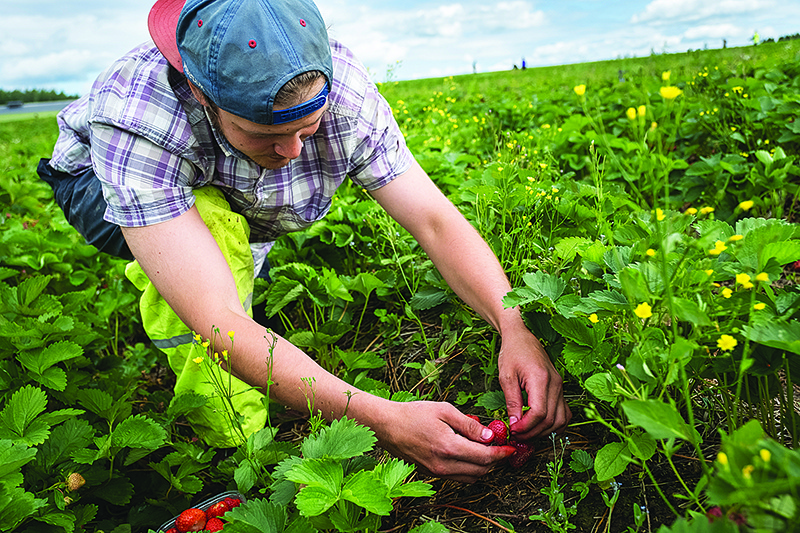
HOLLOLA, Finland: Thousands of Finns have answered a desperate call from farmers to save the summer’s berry harvest, as coronavirus restrictions have kept many of the usual foreign pickers away. “After 22 years, we have Finnish workers on the strawberry fields again, it’s a very unusual situation,” Vesa Koivistoinen, owner of Finland’s largest strawberry farm in the southern village of Hollola, said.
When AFP visited Koivistoinen’s 100-hectare farm two weeks into the strawberry harvest, the large field was dotted with hundreds of people, from teenagers to pensioners, crouching down to pick strawberries then putting them in crates to be weighed and loaded in a lorry. To handle the berry harvests, Finland normally needs about 16,000 seasonal workers a year, “who mainly come from abroad,” Kati Kuula of the agricultural union MTK said.
But when coronavirus travel restrictions were imposed in the spring, agricultural associations and the government feared a labor shortage and launched a number of recruitment programs. One of the largest, the government-backed #Seasonwork social media campaign, features a tanned, blonde couple standing proud in a wheat field, and calls for “every available pair of hands” to “secure domestic food on Finnish dinner tables”. So far this year, only a third of the usual workers have arrived from abroad, all from Ukraine, with the rest of the shortfall recruited from within Finland, Kuula said.
Wage bump
Of the 350 Finns employed on Vesa Koivistoinen’s strawberry farm, the majority are students aged 15-20, but many others are those made jobless by the coronavirus. Sari, a 52-year-old masseuse, replied to the job advert after her own business dried up during the spring.
“I’m the daughter of a farmer and I was working in strawberry fields when I was young,” she said. “So I knew what to expect,” she added. Meanwhile, 29-year-old Janne Erola, who has worked in a number of seasonal jobs but never before in fruit-picking, said he intended to stay until the strawberry season ends in late August. Filling one seven-kilogram (15.5-pound) crate takes “a bit more than an hour”, Erola said, earning him 1.2 euros ($1.36) per kilogram. Koivistoinen said that as the Finns aren’t able to pick as fast as the experienced Ukrainian workers, he has offered them a 10-percent bonus to make it worth their while.
The recruitment efforts and higher salaries have pushed up costs, but Koivistoinen says he will gladly employ home-grown workers in future, too. “We wanted to be able to employ Finns because lots of other firms can’t offer summer jobs this year,” Koivistoinen said.
Yet the demanding physical work in the changeable Finnish weather does not appeal to everyone. “It’s really physical, and it’s quite far from my home,” said 17-year-old Laura, who signed up along with her schoolfriends Senni and Mohammed. All three are sitting by the side of the field having a break, their fingers red with strawberry juice. “I actually had a job offer earlier this summer, but then they said they couldn’t take me because of corona,” Mohammed added.
Berry rescue plea
Yet while domestic labor has come to the rescue of Finland’s strawberry harvest, the fate of this year’s crop of bilberries, a cornerstone of Finnish food culture, looks far more precarious. Every year, Finnish industries from food to cosmetics require 20 million kilograms of bilberries-a small, European variety of the blueberry which is not cultivated in fields but grows abundantly in Finland’s vast forests.
The berries are usually picked by Thai workers brought over for the harvest season in late summer, but the pandemic restrictions mean none will be admitted this year. Instead, Finland’s social media is awash with posts imploring “every working-age Finn to collect a bucket’s worth of bilberries” to stop the berries going to waste. Some of the companies which rely on berries have not been assuaged by the potential reach of social media, and have said they will import their bilberries from Poland or Russia this year, warning this could lead to higher prices on the shelves. —AFP

